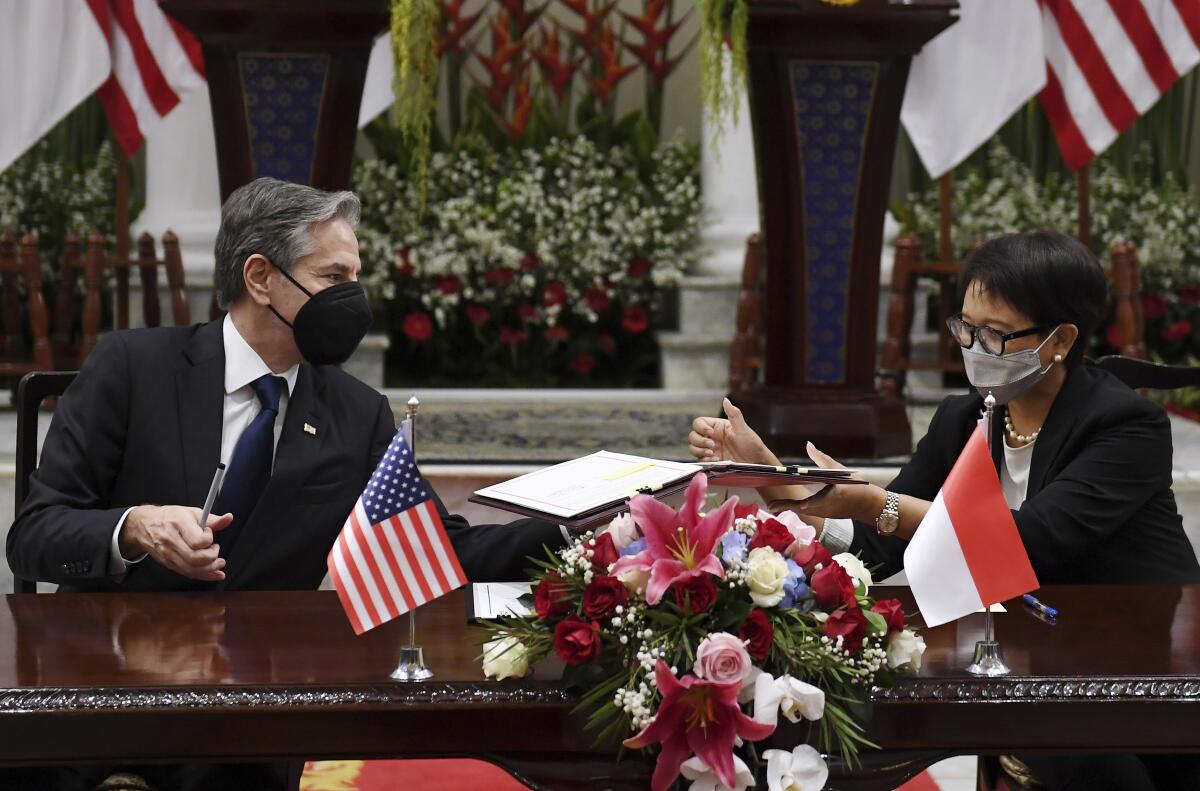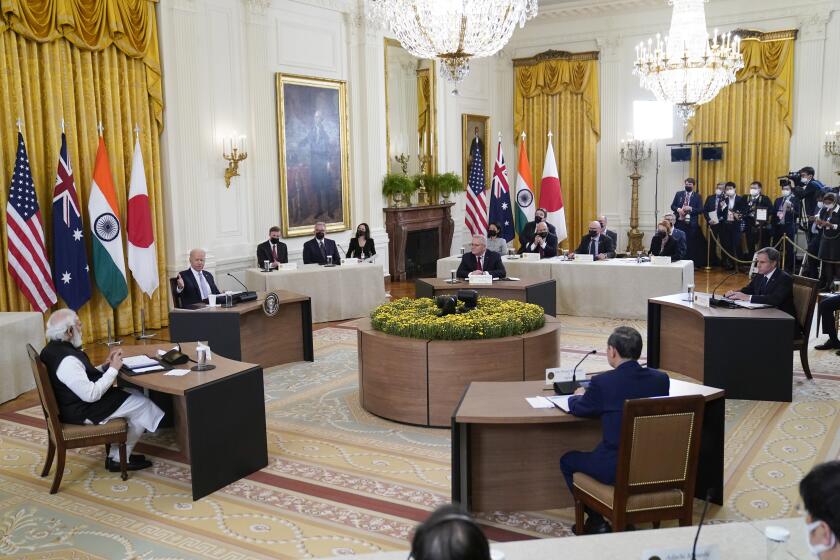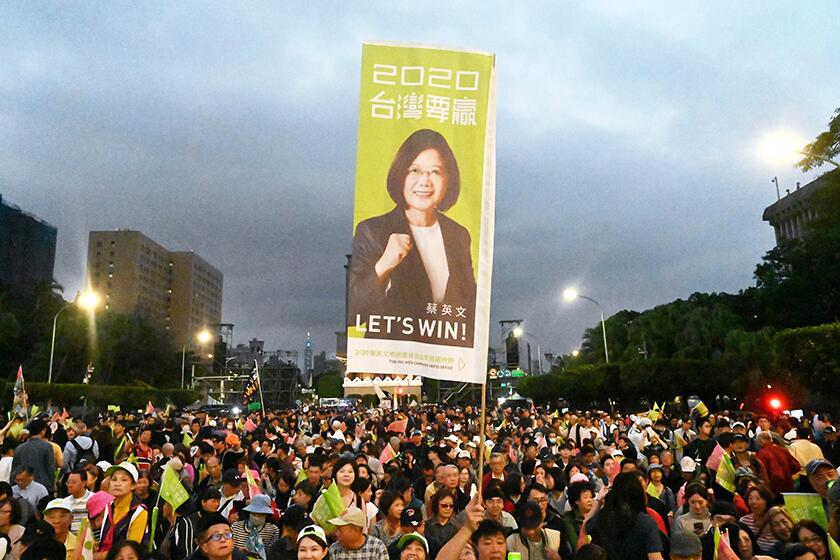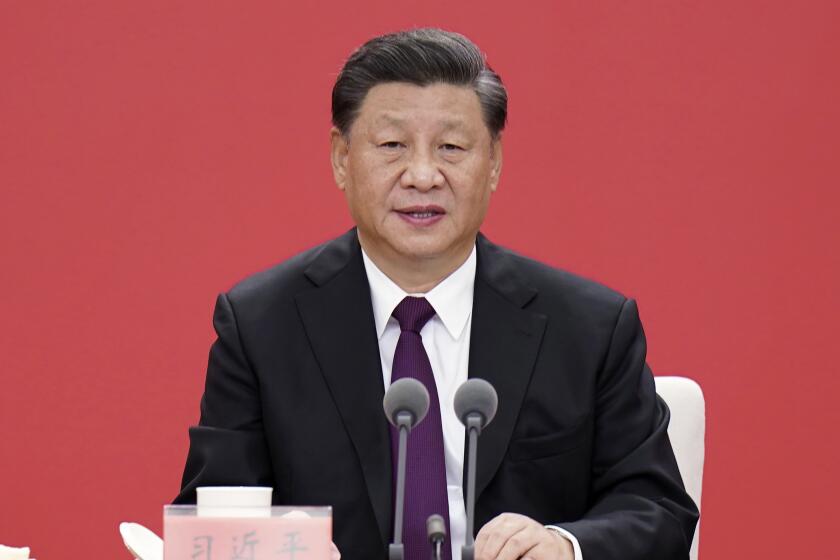Blinken vows to boost U.S. alliances in the Indo-Pacific to counter China

JAKARTA, Indonesia — The United States will expand its military and economic relationships with partners in Asia to push back against China’s increasing assertiveness in the Indo-Pacific, Secretary of State Antony J. Blinken said Tuesday.
Blinken said the Biden administration was committed to maintaining peace and prosperity in the region and would do that by boosting U.S. alliances, forging new relationships and ensuring that the U.S. military maintained “its competitive edge.”
“Threats are evolving; our security approach has to evolve with them. To do that, we will lean on our greatest strength: our alliances and partnerships,” Blinken said in a speech in Indonesia, outlining the administration’s Indo-Pacific plans.
“We’ll adopt a strategy that more closely weaves together all our instruments of national power — diplomacy, military, intelligence — with those of our allies and partners,” he said. That would include linking U.S. and Asian defense industries, integrating supply chains and cooperating on technological innovation, he said.
Later, Blinken and Indonesia’s foreign minister signed a series of three agreements, including one extending until 2026 a maritime pact that among other issues calls for enhanced joint U.S.-Indonesian naval exercises.
“It’s about reinforcing our strengths so we can keep the peace, as we have done in the region for decades,” Blinken said. He did not elaborate, but the Biden administration made waves this year by agreeing to a pact that will see Australia produce nuclear-powered submarines.
The Biden administration is building a Cold War-style web of alliances to contain China. Will China strike back?
Blinken said that Washington was not trying to force countries to choose between the U.S. and China or seeking conflict with Beijing. But he laid out a list of complaints about “Beijing’s aggressive actions” from “Northeast Asia to Southeast Asia and from the Mekong River to the Pacific Islands.”
Blinken is in Indonesia on the first leg of a weeklong, three-nation tour of Southeast Asia that will take him next to Malaysia and Thailand. Countering China’s growing aggressiveness in the region, particularly in the South China Sea, in Hong Kong and against self-ruled Taiwan, is prominent on his agenda.
“Countries across the region want this behavior to change,” he said. “We do, too.
“We are determined to ensure freedom of navigation in the South China Sea. It is also why we have an abiding interest in peace and stability in the Taiwan Strait.”
President Biden’s invitation for Taiwan to participate in his democracy summit draws the island deeper into the struggle between China and the U.S.
Blinken said the U.S. would “forge stronger connections” with its five treaty allies in the region — Australia, Japan, the Philippines, South Korea and Thailand — boost ties among them and cultivate a stronger partnership with the Assn. of Southeast Asian Nations, many of whose members feel threatened by China.
“A strong and independent ASEAN has long been central to tackle urgent crises and long-term challenges,” he said, in particular calling out the military rulers of Myanmar, also known as Burma, for their February takeover of power and subsequent crackdown on protesters.
“We will continue to work with our allies and partners to press the regime to cease its indiscriminate violence, release all of those unjustly detained, allow unhindered access and restore Burma’s path to inclusive democracy,” he said.
Blinken also stressed the Biden administration’s commitment to providing COVID-19 vaccines to the countries of the Indo-Pacific and its support for their efforts to combat and deal with climate change.
As Asia-Pacific leaders meet for an annual economic summit this week, the Biden administration is still struggling to articulate its economic vision for the region. China has sought to take advantage.
He confined his remarks to the Indo-Pacific and China, but he began his current overseas trip in Britain at a meeting of foreign ministers from the Group of 7 leading industrialized nations, which delivered a stern warning to Russia regarding Ukraine.
On arriving in Indonesia on Monday, Blinken found that a top aide to Russian President Vladimir Putin, national security advisor Nikolai Patrushev, was already in Jakarta for security talks.
Asked why he had not sought out Patrushev to expand on Sunday’s G-7 warning, Blinken said the Biden administration’s top diplomat for Europe, Karen Donfried, who is in Ukraine, would travel to Moscow in the coming days to deliver that message.
More to Read
Sign up for Essential California
The most important California stories and recommendations in your inbox every morning.
You may occasionally receive promotional content from the Los Angeles Times.













